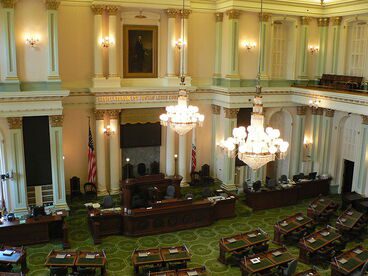 California State Assembly room. Photo Copyright © 2005 David Monniaux via Wikimedia Commons.
California State Assembly room. Photo Copyright © 2005 David Monniaux via Wikimedia Commons.
Here’s a look at some of the laws that went into effect at the dawn of 2021, from CalMatters and the New York Times.
Minimum wage
Employers must pay a minimum wage of $14 per hour, a $1 increase from last year’s hourly minimum. Businesses with fewer than 26 workers must increase their hourly wage to at least $13. Some cities, like Palo Alto, Sonoma and Mountain View have already increased their minimum wages to $15 or more this year. Marin County’s minimum wage is $15.40.
Expansion of paid family-leave benefits
A new law that went into effect this year expands family-leave benefits for nearly six million residents. It also ensures that Californians who work for an employer with at least five employees are included in job protection benefits. Previously, 40 percent of residents were at risk of losing their jobs if taking leave simply because their employer was too small. The new law also expands on the potential reasons for taking leave, making it possible for workers affected by Covid-19 to take time off to care for a parent, sibling or grandchild.
Increased consumer financial protections
The California Consumer Financial Protection Law gives the revamped Department of Financial Protection and Innovation, which is modeled after the federal Consumer Financial Protection Bureau, a broad set of new powers and restores certain financial protections. Pandemic-inspired scams that promise Covid-19 cures or aim to cheat people out of stimulus checks are on the rise throughout the state.
Workplace Covid-19 protections
The new law requires employers to take specific actions, like written notifications to employees, within one business day of a potential exposure to Covid-19 in the workplace. The notification must be written in English and another language, if applicable.
Inmate firefighters
A longstanding program that relies on incarcerated individuals to fight wildfires will now allow nonviolent offenders to petition to get their records expunged and to use their training to gain employment as firefighters. Inmates were previously barred from becoming professional firefighters after release because of their criminal records. After a devastating fire season, when many inmate firefighters were released early because of the pandemic, prisoner firefighting crews served a crucial role. However, critics of the program compare it to slave labor, since prisoners flighting blazes on the front lines make just $1 an hour while working in treacherous conditions.
Criminal justice reform
The California Racial Justice Act expands opportunities for defendants to challenge a charge or conviction by demonstrating that there was racial bias present in their case. For judgments issued on or after Jan. 1, challenges can be made if racially coded language is used in court or if there were displays of intentional discrimination by a lawyer, judge or juror. In addition, convictions or sentences can be challenged if there is evidence that people of one race are disproportionately charged or convicted of a specific crime or if one race is singled out to receive longer or more severe sentences.
Some new laws won’t go into effect until later this year. In February, Proposition 19, which requires people who inherit property to use it as their primary residence or have its tax value reassessed, goes into effect. In July, Californians will be prohibited from buying more than one semiautomatic rifle in a 30-day period. And a flavored-tobacco ban that was set to go into effect at the end of 2020 won’t be adopted until at least 2022.
MORE INFO, INCLUDING ONE-MINUTE EXPLAINER VIDEOS, FROM CALMATTERS.
